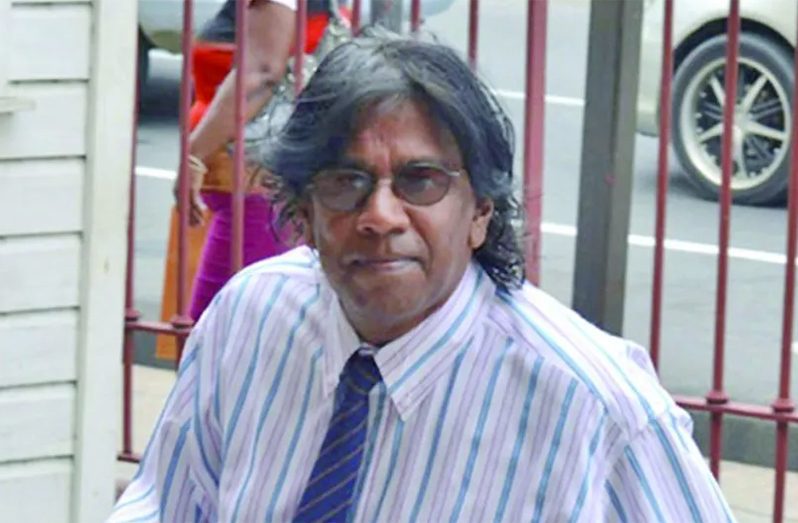By Freddie Kissoon
IT was Karl Marx who popularized the role of the state apparatus in the suppression of weaker classes by dominant class forces. But Marx was not the originator of the crucial role of the coercive state apparatus in the maintenance of hegemony by the wealthier classes.
The elaboration of the role the state plays in stabilizing society goes way back to Plato in ancient Greek times. An elementary reading of Plato would inform the reader that he placed extreme emphasis on the role of the state to ensure the survival of the republic.
The Romans found Plato’s role of the state to be sacrosanct and that explains why the state under Roman rule became ubiquitous where everyone, wealthy or extraordinarily wealthy had to pay homage to the state.
The dissatisfaction with the all-powerful state found expression in 2015 when the barons rebelled against King John’s repressive role. The Renaissance and the Enlightenment were both designed to give more power to social forces, while only the French philosopher John Jacques Rousseau argued for the abolition of the state.
Nicola Machiavelli, Thomas Hobbes and Edmund Burke saw a strong state as indispensable, while John Locke went far back to Plato’s Nocturnal Council in arguing that though the state is necessary, it has to offer water-tight obligations to the property-owners
An unlikely philosophical harmony occurred in late 19th century politics when two opposing ideologies found common ground in their treatment of the state. Both communism and fascism saw the coming of the Nietzsche’s Übermensch as the classless future, though Marxist philosophers would pour scorn on the importance of the Übermensch.
On the other hand, European colonialism and American imperialism in the 19th and 20th centuries used the state to ensure capitalist hegemony in the world. With the rise of the Cold War after WW2, the state in both the USSR and the USA became Orwellian. What Edward Snowden revealed about the US intelligence community was inevitable, but it is not confined to the US alone.
When we apply the above description of the role of the state, it cannot support a theory of creeping apartheid in Guyana. There were two apartheid systems in the world – White denial of African rights in South Africa and Israeli humiliation and destruction of the dignity of Palestinians. South African apartheid was destroyed. The Palestinians are still in the throes of ethnic subjugation.
In both of these racist systems, the coercive state apparatus preserved the system through control and repression by ethnic profusion. In Guyana, such ethnic saturation does not exist, thus destroying the theory of creeping apartheid.
White perpetuation of apartheid was done through a ubiquitous state system. The security platforms, the judiciary, the bureaucracy and the education system excluded Blacks for two reasons – they were considered genetically inferior and were not trusted with state power.
In Guyana, it is not only that apartheid does not exist, but there can be room for a provocative argument that East Indians lack sociological and state power; therefore they are most likely to suffer discrimination, police victimization and social denial.
In Guyana, the coercive state apparatus is 95 per cent African dominated. State bureaucracy and its related organs are 95 per cent African dominated. The education system has a predominance of African teachers in particular Regions Four, Five, Nine and 10. In Regions Two, Three and Six there is no overwhelming numbers of Indian teachers.
In tertiary education, the African presence is graphic. Guyana has only one state-owned university and for the past 30 years it has been controlled by a small incestuous cabal whose hegemony is impossible to dissolve. This cabal is undemocratic, unaccountable and opaque in its administrative transactions and is all-African. The university started by the Indian Premier Cheddi Jagan in 1963 has never had an Indian Vice-Chancellor. Simply put, in its 60-year-old history there has never been an Indian head at UG.
In state medical services, there is no Indian predominance in doctors, nurses and auxiliary staff. In the legal community, there are no alarming numbers of Indian lawyers comparatively speaking. The Indians and Africans are just about equal in the judiciary and magistracy.
In sports, Indians are not represented in basketball, hockey and soccer. In cricket there is a marked presence of African players. In the entertainment business, this is an area in which Africans are pronounced.
This leaves us with the economy. The number of wealthy Indian entrepreneurs far outstrips their African counterparts, but it is vulgarization of academia to argue that this constitutes an apartheid system. An overwhelming presence of Indians in the investment sector cannot constitute an apartheid system.
In Guyana, poverty is equally pronounced among both major races. My wife and I went to two Muslin orphanages to make donations. None of the children were Africans. To be continued.
Columnist’s note: My column was rejected by the Kaieteur News












